- Home
- T.A. Barron
A Wizard's Wings Page 25
A Wizard's Wings Read online
Page 25
Both of the ghostly serpents faced each other, opened their jaws, and started hissing savagely. Ionn whinnied and shook his mane, though Rhia kept him from bolting. Her companion, Scullyrumpus, scampered across her shoulder, wrapping his furry paws around her neck. His eyes grew as round as moons themselves, and he shuddered, flapping his ears against his head.
Like the roaring beneath the circle, the snakes’ hissing grew louder. Then, in the open space between their wide mouths, a vague shape began to form. It looked, at first, like a glistening silver thread that stretched between their heads. The thread split along its middle, while bowing upward and downward, until it formed the outline of an egg. The egg grew rounder and rounder, a misty circle within the circle of stones.
All the while, the serpents hissed angrily at each other. Hovering over the ground, the circle started to spin—slowly at first, then faster and faster. In seconds it became a round blur, and then a sphere. Louder roared the tumult of voices; brighter glowed the sphere. Yet more than brightness, or even roundness, this sphere seemed to possess a kind of depth.
All at once I realized that it was not really a sphere—but a hole. A hole leading down to the world below. At the instant it became fully formed, the serpents withdrew, fading back into vapors that finally vanished.
But the hole remained, suspended in the air just above the ground. Suddenly, from out of its center, a terrible apparition emerged. It slid outward, expanding as it stretched its jagged wings to fly. Shining silver against the night sky, it had the scaly body of a dragon, with a fearsome, barbed tail, and the head of a giant frog with menacing spikes protruding from its brow. From its forelegs hung vicious, curved claws, long and sharp enough to impale several men and women with a single swipe.
Many of the Fincayrans crowding around the circle gasped in horror as this monster from the spirit world flapped its wings and rose into the sky. Even worse, though, were the silvery shapes that came after it: ogres with bulging, filmy eyes, and arms that reached down to their feet; serpentine wraiths that kindled fire as they slithered over the ground; and enormous lizards that strode about on their hind legs, with pulsing necks and snapping jaws filled with row upon row of daggerlike teeth. Like the winged monster, they had ghostly, silver-toned bodies, sturdy enough to strike painful blows, yet wispy enough to seem made partly of mist.
Next, from the tunnel to the Otherworld, came ghostly figures of a different kind—one I knew all too well in mortal form. Warrior goblins! By the scores, by the hundreds, by the thousands it seemed, these spirit goblins poured out of the hole, brandishing deadly swords.
The furious battle began. Silvery warriors rushed at the defenders, slashing and thrusting with blades, claws, and teeth. Fincayrans who were seasoned fighters—such as dwarves, wolves, bears, men and women—returned the blows in equal measure. The fighting raged, both inside the circle and across the whole expanse of hillside.
Rhia, her hair streaming, rode from one fray to another, rescuing those in trouble, jabbing at invaders with a spear she had found. Shim and the other giants hurled handfuls of attackers into the distant hills. Canyon eagles and marsh ghouls attacked from the air, shrieking vengefully. Gwynnia swooped down on the huge lizards, scorching them with her first breaths of fire, then trained her wrath on the winged monster, pursuing it across the sky.
No one battled more savagely than the trees. They waded right into groups of warrior goblins, swinging their mighty limbs like battle-axes. Foes broke off their branches and slashed at their trunks, but the trees kept on fighting, striking powerful blows with their roots. Several trees even toppled themselves to pin down invaders. Leaves and chips of bark showered the terrain.
Swinging my sword wildly, I fought off attackers trying to dislodge me from the boulder. At the same time, I hurled fireballs this way and that, anywhere I spotted someone needing help. When I glimpsed two deer people about to be mauled by a warrior goblin, I let loose a searing blast that engulfed the goblin’s sword in flames. Just then I caught sight of an ogre about to pounce from one of the pillars on top of Rhia, who was riding right beneath him. I threw a fireball that struck the pillar and exploded into arcs of flame, knocking the ogre backward.
Everywhere I turned, however, Fincayrans were taking a terrible beating. I witnessed, too late to help, as many brave fighters lost their lives. One huge bear continued slamming her paws at the invaders even with half a dozen swords lodged in her legs and back. Finally, she fell, her burly frame crushing three warrior goblins as she crashed to the ground.
Seeing the bear go down, I seethed with fury. Then I watched the worst of it: The goblins got up again. The bear did not.
Great seasons! How could I have ever thought mortal creatures could prevail over deathless spirits? How could Dagda? All we could do, at best, was defend ourselves. And that couldn’t last indefinitely. Not against such numbers. Even my magic couldn’t turn back a whole invasion. My fireballs only won us time, not victory.
The hard truth could not be denied. I’d urged my friends to join in a battle we couldn’t possibly win! And yet I knew, as well, that this was a battle we would have fought in any case. A battle for our homeland.
Suddenly I caught a glimpse of my friend Cairpré, at the other side of the circle. He was in trouble! Standing over someone who had been wounded, he was trying valiantly to keep a band of warrior goblins from killing them both. By sheer fury he was holding them off, though his only weapon was the broken branch of a tree. But he was flagging. Blood spattered his chest, and he staggered weakly. A goblin was about to hurl a lance at him from atop a slanting pillar.
With a vengeful cry, I vaulted off the living stone. Flinging fireballs into Cairpré’s assailants, I rushed at them. One flaming missile struck the assailant on the pillar, but not before he released his lance with an angry roar. In a few seconds, I drove the others away, and ran to my friend’s side.
Too late. Cairpré slumped to the ground, blood soaking his once-white tunic. The spear protruded from the base of his ribs. Immediately I set to work extracting it, though he writhed in anguish as I pulled it free. Finally, I cast the weapon aside.
Then, as I propped his gray head on my lap, I saw the face of the person he’d been so gallantly defending. Hallia! Her thigh had been cut, and her forehead bruised, but all the same, she lived. I held out my hand to her, my heart pounding with both relief and dread. She took it, sliding closer to me. Without a word, we turned back to the wounded bard.
As soon as I felt the weakness of his pulse, I knew that his life was rapidly fading. Concentrating my thoughts, I tried my best to ignore the fray around us. Carefully, gently, I probed within his wounded chest. Organs, muscles, and tissues cried out to me, all at once, yet I lacked time even to begin mending them. At least I could stop some of the bleeding! With all my will, I tried to stem the flow of blood.
“Merlin,” he said, his voice dry and scraping. “It’s too late for me. But Hallia . . .”
“Will be fine,” she completed, taking his hand and holding it against her cheek. “Thanks to you.”
The poet smiled painfully. He started to speak, but a ragged cough interrupted him. When the spasm receded, his head slumped back heavily on my lap.
“You shouldn’t have come,” I declared, brushing the shaggy hair away from his eyes.
Desperately, I searched my mind for some way to help. “I could try to take your spirit into myself—as I did once for Rhia, remember? Then I’d have time to work on your body. It might work, old friend! Let me try.”
He squinted, studying me thoughtfully. It was a look I knew well from our years together, the look of a mentor who was also much more.
“No,” he answered hoarsely. “This is . . . my time.” He closed his eyes tight, then reopened them. “Do you remember that old couplet? The leaf, still green, must someday fall. Such gr—” A new spurt of coughing cut him short.
When he quieted, I said the rest: “Such grief, and joy, to live at all.”
&nbs
p; Again, he forced a smile. “So you did finally learn . . . a few lines of poetry, eh?”
“Not nearly enough,” I replied. “Cairpré, are you sure? It could work.”
“I’m sure, Merlin.” His bushy eyebrows drew together, as a different sort of pain struck his face. “I wish I could say good-bye . . . to Elen.”
Somberly, I nodded. “She’d tell you that you could never really say good-bye.”
“Yes,” he said with a wistful grin, “and be endlessly . . . stubborn about it, too.” He turned his head and gazed up at the full moon, radiant in the night sky. For a long moment, none of us spoke, as the sounds of brutal combat raged around us.
“What are you thinking about?” I asked at last. “Not composing a verse?”
“You know me well,” he replied, shifting his gaze to me. “I was searching for the right word to rhyme . . .” His limp hand found its way into my own. “With friend.”
A sob rose out of my chest, and I couldn’t keep it from escaping.
“You are a true mage, my boy . . . full of greatness.” He blinked, trying to focus on my face. “And your greatness flows not from your power, which is vast . . . but from your compassionate heart.”
I slammed my fist against the stone pillar behind us. “What kind of mage am I if I can’t do anything to save my friend—or my homeland?”
“Fincayra’s not lost . . . yet.”
Glancing at the battleground surrounding us, I knew better. Everywhere, Fincayra’s defenders lay dead or dying; cries of anguish raked my ears. The spirit warriors, especially the goblins, kept hacking away ruthlessly, without any signs of tiring. And despite their heroism, the Fincayrans were faltering. But for the marsh ghouls, who were deathless themselves, most of those who had stood on this hillside at sunset would surely be dead by morning. Or if they somehow survived the onslaught, Rhita Gawr’s forces would kill or enslave them before long.
Feeling Cairpré’s head and neck suddenly stiffen in my lap, I looked down at him again. His eyes seemed dull, his breathing forced.
“Merlin . . . ,” he rasped weakly, then stopped, working his tongue. “I hope . . . oh, never mind. I never was very good . . . at endings.”
His eyes closed, and remained that way. The battle raged all around us, but I heard nothing except the echo of the poet’s final couplet. The leaf, still green, must someday fall.
Then, from beside a towering pillar next to us, I heard another voice. One that made my scarred cheeks burn. It was, I knew, the voice of Rhita Gawr.
33: A DISTANT HORN
Such a shame, tut tut, to lose a friend,” said Rhita Gawr, his voice oozing mock concern. “Ah well, just part of life, I suppose.”
Angrily, I leaped to my feet and faced the tall, broad-shouldered man who had spoken. Even amidst the tumult of battle, he seemed exquisitely calm and composed. He wore a light blue tunic, unstained by so much as a single fleck of dirt, which rippled elegantly in the moonlight. His hair, as black as my own, lay perfectly parted and combed. Even his eyebrows looked immaculately groomed. Only his eyes, as vacant as the void, and the wrathful turn of his mouth, revealed his true nature.
“You know nothing of life,” I snapped, glaring at him.
Casually, he licked the tips of two of his fingers. “Mortal life, yes,” he answered in gloating tones. He stroked the hairs of one eyebrow, flattening them with his moist fingers. “But what is that compared to the life of an immortal spirit?”
I straightened myself. “Everything.”
Still stroking his eyebrow, he spoke with renewed sympathy. “How sad, my dear wizard, you haven’t learned the difference yet. Sad for you. And also sad for your friends.” He gestured at the body of Cairpré at my feet, and then at the mounting slaughter surrounding us. On every side, mangled forms lay draped over the encircling stones or sprawled upon the bloody ground. “The friends you caused to lose their lives tonight.”
My scarred cheeks throbbed. “That’s not true. All these people are here not for me, but for Fincayra.”
“Ah, but of course. How clumsy of me to forget! Fincayra . . . wasn’t that the name of a place? A world that once existed?”
My reply caught in my throat. For I couldn’t dispute the truth of his words. Right beside me, a pine tree, toppled against a pillar, was being torn to bits by swarming lizards; a pair of brawny dwarves had just been skewered by a spirit goblin’s lance; and my old friend and mentor lay dead on the ground. With every passing second, the numbers of slain and wounded swelled—and the chances for our world to survive diminished.
Rhita Gawr sniggered. “Your pitiful little army,” he said with a casual wave, “has already lost.” His hollow eyes glowered at me. “And so have you.” He raised his arm and pointed menacingly at me. “A lightning bolt should do it. Yes, one strong enough to obliterate even your ashes.”
“No!” protested Hallia, dropping Cairpré’s lifeless hand. “Don’t kill him, please.” She stood and limped to my side, her whole body trembling. I tried to push her back behind me, but she refused to move.
Feigning a look of sorrow, the warlord of the Otherworld leaned his head against the great pillar beside him. “Ah, doe woman, you make things so complicated. I’ve been looking forward to the chance to kill your friend here for quite some time, you see. And since my sword-armed soldier didn’t manage to do it, I really must.”
Calmly, he started buffing his fingernails against his tunic. “But if you insist, like a good little maiden, I shall kill you first. That way he will have the pleasure of causing your death, too.”
“You are a coward,” I declared.
His expression darkened. “And you are a fool. One soon to die.”
The tip of his forefinger began to glow red, as the bolt of lightning gathered, about to burst forth. While combat continued to swirl around us, for a fleeting moment I saw nothing but Rhita Gawr: the swelling light of his finger, the wicked void of his eyes. His finger twitched, ready to release the blast.
Suddenly, a silver-hued shape shot out of the night sky. Plummeting downward, it whistled sharply just before it slammed full force into Rhita Gawr’s arm. His lightning bolt exploded with a resounding blast, but went askew, slamming into the pack of lizards chewing on the fallen tree. Scarlet flames engulfed them. The warlord roared angrily, clutching his arm through his torn tunic.
As fast as it had arrived, the shape disappeared into the silvery beams of moonlight on high. Not before I glimpsed its outline, though. Just as I’d heard its whistle, and recognized its boldness. My friend Trouble had returned! He must have followed Rhita Gawr out of the Otherworld, then circled silently overhead until the moment we needed him. The moment I needed him. How like the hawk I knew so well!
Hallia and I stared up at the sky—as did Rhita Gawr himself, boiling with rage. Though all of us were searching for the hawk, we saw instead something strange. So unaccountably strange that I stumbled backward in disbelief, knocking into the slanted pillar behind me.
Flying toward us, bright under the glowing moon, came seventy or eighty figures. They floated steadily nearer, their bodies bobbing with the gusts of air, like a flock of ungainly birds. But these were no birds, nor any creatures with wings. These were children.
The children. Steadying myself against the block of stone, I watched them approach. Swiftly, they sailed toward our hilltop, arms and legs outstretched, tattered clothing flapping against their bodies. Flying! But without wings. How?
In the lead, his face aglow in the moonlight, I saw a small boy. Lleu! The woolen scarf that had once belonged to Cairpré trailed behind him, fluttering in the night. To one side, I saw Medba—flying upside down, her hair blowing crazily. To the other, I found little Cuwenna, holding the hand of someone much larger: Elen. I glanced down at the corpse of the bard at my feet, shuddering at what grim tidings awaited her.
Then my whole body stiffened, as I thought of what awaited the children. They were flying into a gruesome battle. No, into certain death! Whatever
allowed them to soar this way, I felt sure, couldn’t also spare them from being killed once they landed.
As the flying children neared the circle of stones, one combatant after another looked skyward. The fighting slowed, then finally halted, as puzzled warriors—mortal and immortal alike—paused to view the uncanny sight. All across the hillside, a collective hush fell over the battlers. Even Rhita Gawr kept staring at the sky, seemingly unsure what to make of this.
At that moment, I caught the slightest scent of cinnamon on the air. A gust of warm wind brushed against my cheek. And I understood, in a flash, how the children were able to fly.
“Aylah,” I whispered anxiously, not wanting Rhita Gawr to hear. “Why did you bring them? They’ll all be killed!”
The wind sister swirled about me, ruffling the sleeves of my tunic. “It was you, Emrys Merlin, who called to me, from the land long forgotten. Do you not recall?”
I winced. “Yes, yes,” I whispered. “I sought your help to get here. But—”
“And when I arrived at that place, Emrys Merlin, you had already gone. The boy named Lleu begged me to carry him to you. As did the others, including the one you call Mother. I could not refuse them, ahhh no, for I could tell they spoke solely out of loyalty and love.”
“They will die!” I exclaimed, shouting in distress. “Every last one of them will die!”
My outburst echoed over the hushed hillside, startling the combatants. One warrior goblin in the center of the ring turned to another and asked in a bewildered voice: “We’ll all die?” The second goblin repeated the words, as did another, and another. Like ripples flowing over a tarn, the phrase swept across the circle and down the hillside. We’ll all die, went the refrain. Every last one of us will die.

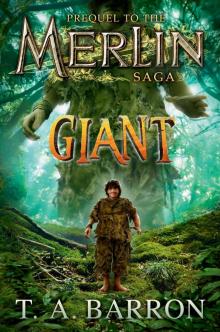 Giant
Giant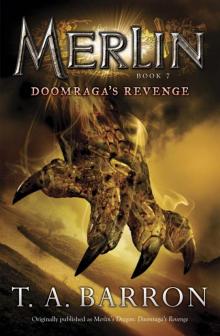 Doomraga's Revenge
Doomraga's Revenge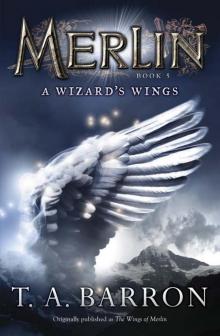 A Wizard's Wings
A Wizard's Wings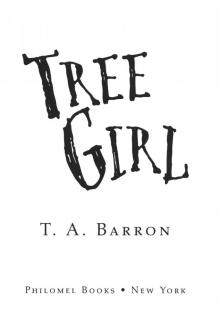 Tree Girl
Tree Girl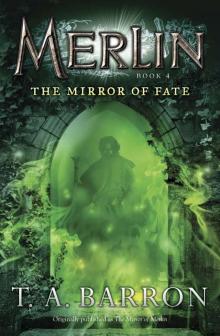 The Mirror of Fate
The Mirror of Fate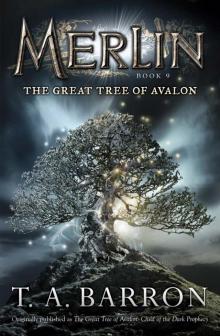 The Great Tree of Avalon
The Great Tree of Avalon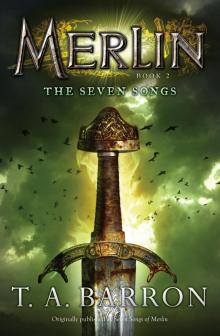 The Seven Songs
The Seven Songs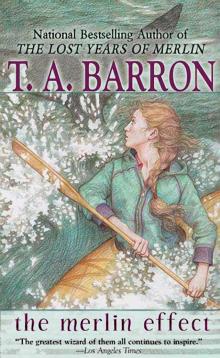 The Merlin Effect
The Merlin Effect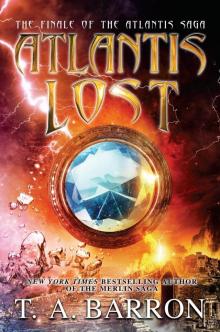 Atlantis Lost
Atlantis Lost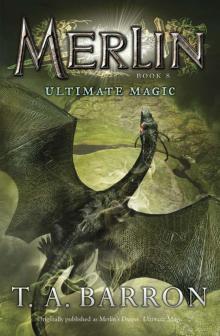 Ultimate Magic
Ultimate Magic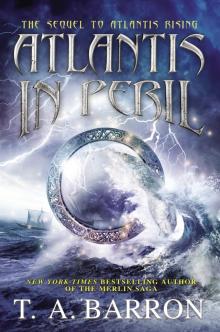 Atlantis in Peril
Atlantis in Peril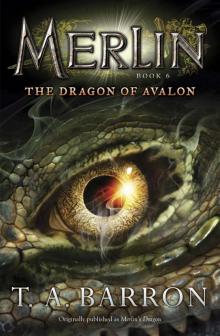 The Dragon of Avalon
The Dragon of Avalon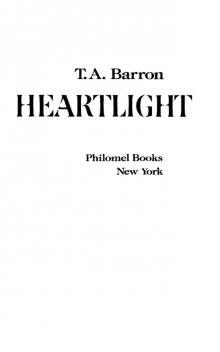 Heartlight
Heartlight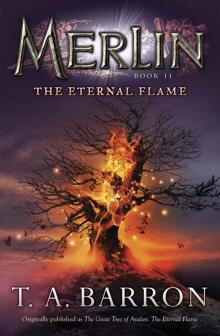 The Eternal Flame
The Eternal Flame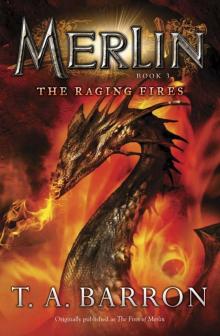 The Raging Fires
The Raging Fires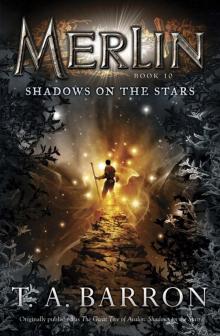 Shadows on the Stars
Shadows on the Stars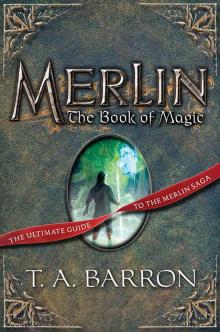 Merlin: The Book of Magic
Merlin: The Book of Magic The Lost Years
The Lost Years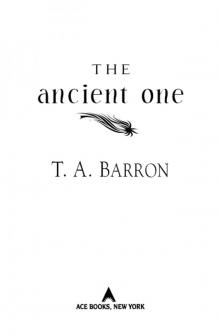 The Ancient One
The Ancient One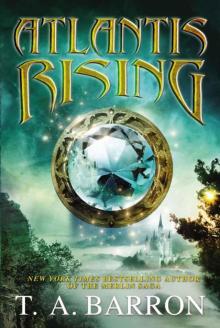 Atlantis Rising
Atlantis Rising